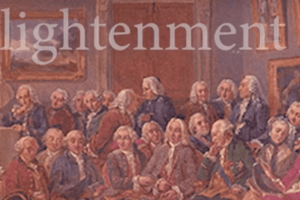Podcast
Questions and Answers
What was the Enlightenment?
What was the Enlightenment?
- The age of industrialization
- The renaissance of the arts
- A time where reason was thought to solve human problems (correct)
- A period of unreason and chaos
What was the impact of the Enlightenment?
What was the impact of the Enlightenment?
The Enlightenment introduced new ways of thinking about government, religion, economics, education, and caused many political revolutions.
Name two philosophes and explain their basic beliefs.
Name two philosophes and explain their basic beliefs.
Voltaire was a critic of Christianity and advocated for religious toleration; Cesare Beccaria believed in reforming justice and avoiding brutal punishments.
How did Thomas Hobbes and John Locke differ in their views on government?
How did Thomas Hobbes and John Locke differ in their views on government?
What was a salon and how did it help to spread the ideas of the Enlightenment?
What was a salon and how did it help to spread the ideas of the Enlightenment?
What is a revolution?
What is a revolution?
What are the three things that a revolution usually includes?
What are the three things that a revolution usually includes?
What is a political revolution?
What is a political revolution?
What are two causes and two effects of a political revolution?
What are two causes and two effects of a political revolution?
What was the Scientific Revolution?
What was the Scientific Revolution?
What was the impact of the Scientific Revolution?
What was the impact of the Scientific Revolution?
Name two scientists from the Scientific Revolution and explain their discoveries.
Name two scientists from the Scientific Revolution and explain their discoveries.
What three factors affected scientific thinking up until the Scientific Revolution?
What three factors affected scientific thinking up until the Scientific Revolution?
Flashcards are hidden until you start studying
Study Notes
The Enlightenment Overview
- Known as the "Age of Reason," the Enlightenment occurred in the 1700s, emphasizing human reason as a solution to societal issues.
- It led to a reevaluation of government, religion, and education, significantly influencing political revolutions in the late 18th century.
Key Philosophes
-
Voltaire
- Critiqued Christianity, advocating for religious toleration.
- Championed deism, emphasizing natural law and reason.
-
Cesare Beccaria
- Criticized brutal punishments in justice systems, arguing they did not deter crime.
- Promoted reforms to create a more humane approach to justice.
Government Perspectives
-
Thomas Hobbes
- Advocated for centralized power in a single ruler to unify citizens.
-
John Locke
- Argued for limited government power and the protection of life, liberty, and property.
Salons and Enlightenment Ideas
- Salons were gatherings in elite homes where thinkers discussed and spread Enlightenment philosophies, promoting social change.
Revolution Defined
- A revolution involves a forcible change in government or social order.
- Types include political revolutions, the Scientific Revolution, and the Industrial Revolution.
Components of a Revolution
- Mass mobilization of people.
- Establishment of new political and societal structures.
- Aimed at creating a better society.
Political Revolution Explained
- Characterized by dissatisfaction with governance, leading citizens to advocate for a new or reformed government.
Causes and Effects of Political Revolutions
-
Causes
- Anger toward social injustices and corruption.
- Economic turmoil.
-
Effects
- Establishment of new governmental systems.
- Implementation of new laws and cultural shifts within society.
Scientific Revolution Overview
- Occurred in the 16th-17th centuries, marking a shift from religious to scientific thinking.
- Introduced modern scientific methods, fundamentally changing worldviews.
Impact of the Scientific Revolution
- Established the scientific method, comprising hypothesis formulation, experimentation, and conclusion drawing.
- Contributed significantly to the Enlightenment's emergence.
Notable Scientists
-
Johannes Kepler
- Studied celestial bodies, revealing that planets move in elliptical orbits around the Sun.
-
Isaac Newton
- Formulated the law of universal gravitation, linking terrestrial and celestial object behavior.
Influences on Scientific Thought
- Preceding scientific development was shaped by:
- Ancient Greek writings.
- Technological advancements from the Middle Ages.
- Religious policies impacting intellectual exploration.
Studying That Suits You
Use AI to generate personalized quizzes and flashcards to suit your learning preferences.





